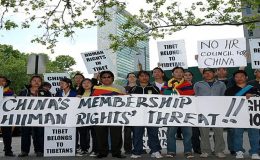4 June 2015
To the Presidents, Prime Ministers, Chancellor and Foreign Ministers of G7 countries, copied to the High Representative of the European Union for Foreign Affairs and Security Policy;
Your Excellencies,
We are writing prior to the G7 Summit to ask for your commitment, as representatives of the world’s most influential countries, to create a means by which you are able to jointly strategise and press for meaningful improvements to the conditions in Tibet, which is currently in a state of heightened crisis.
Currently Tibet is experiencing a cycle of severe repression, resistance and further repression. While a number of G7 governments have made strong statements calling on China to end counter-productive policies that are exacerbating Tibetans grievances, China has continued to ignore these lone requests and intensified its grip on Tibet.
China has achieved this by imposing severe limitations on freedom of expression and opinion, by detaining non-violent protesters without judicial process, and by interfering with cultural expression and religious tradition to the point where Tibetans believe their very existence as a people is at risk. Since 2009 more than 140 Tibetans living under Chinese rule have set themselves on fire; as many as 120 have died including Sangye Tso, a 36-year old mother of two, who protested and died on 27 May 2015.
We believe this situation can be resolved, but only if the world’s most influential governments work together to maintain pressure on China to recognise and uphold universal values, and by taking action that does not need the agreement of the Chinese government. This will create an impetus for a new level of collaborative engagement on the Tibet issue by like minded governments.
Bearing in mind that G8 Foreign Ministers in 2013 reiterated the group of nations’ “collective responsibility and opportunity to use its influence to address some of the most pressing issues in the world”, we urge G7 governments to meet with His Holiness the Dalai Lama whenever he visits G7 countries, sending a message to China that your governments will not be bullied as well as sending a strong message of solidarity to the Tibetan people.
We further urge you to:
1) Establish and participate in collaborative action for Tibet – by way of a Contact Group or Tibet forum – to devise and implement new, more robust, coordinated strategies for resolving the Tibet crisis and persuading China to end the current crackdown on the Tibetan people and to re-enter negotiations with representatives of the Dalai Lama in order to find a peaceful resolution for the Tibetan people.
2) Issue a joint G7 statement seeking access by independent and impartial monitors to assess conditions on the ground, and lifting restrictions on media and diplomatic access to all Tibetan regions.
Yours sincerely,
Alison Reynolds
Executive Director, International Tibet Network on behalf of the following G7 and EU Member Groups:
CANADA:
Canadian Tibetan Association of Ontario
Canada Tibet Committee
Ottawa Tibetan Association
Students for a Free Tibet Canada
Tibetan Cultural Association of Quebec
EUROPEAN UNION:
Austrian Committee for Tibet
Les Amis du Tibet-Belgique
Students for a Free Tibet, Denmark
Students for a Free Tibet, Poland
The Tibet Support Committee, Denmark
Lungta, Belgium
FRANCE:
Aide aux Réfugiés Tibétains
Association Drome-Ardeche Tibet
France-Tibet
NiceTibet
Objectif-Tibet
Students for a Free Tibet, France
GERMANY:
Tibet Initiative Deutschland
JAPAN:
Students for a Free Tibet, Japan
ITALY:
Associazione Italia-Tibet
UNITED KINGDOM:
Students for a Free Tibet, UK
Tibetan Community in the UK
Tibet Society
UNITED STATES OF AMERICA:
Bay Area Friends of Tibet
Committee of 100 for Tibet
Philadelphia Tibetan Association
Students for a Free Tibet International
Tibetan Association of Southern California
Tibet Committee of Fairbanks, Alaska
Tibet Justice Centre
TIBETMichigan
United Nations for a Free Tibet
US Tibet Committee
The International Tibet Network is a global coalition of 185 Tibet related non-governmental organizations representing over one million individuals. Network Member organisations regard Tibet as an occupied country and are dedicated to ending human rights violations in Tibet, and to working actively to restore the Tibetan people’s right under international law to determine their own political, economic, social, religious, and cultural status. See www.TibetNetwork.org




